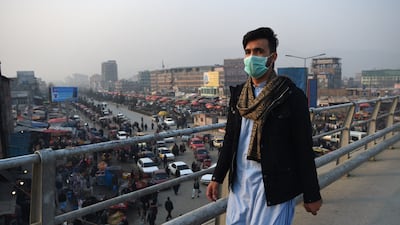Countries in the Middle East have the world’s highest levels of dangerous air pollution particles, which are causing millions of heart disease deaths globally each year, according to a new report.
The World Heart Foundation (WHF) found that Kuwait, Egypt and Afghanistan have the worst concentrations of particles less than 2.5 micrometres in diameter (PM2.5), which come from sources that include vehicle exhaust fumes, power plant combustion and burning wood.
The WHO recommends countries to not exceed 5 micrograms of PM2.5 per cubic metre – expressed as 5 µg/m³.
However, in each of the three countries, levels are more than 12 times higher than the recommended maximum, standing at 64.1 µg/m³ in Kuwait, 63.2 µg/m³ in Egypt and 62.5 µg/m³ in Afghanistan.
Globally, almost 7 million deaths were attributed to air pollution in 2019 – a higher mortality toll than all wars, malaria, tuberculosis, HIV and other infectious diseases combined, according to the WHF.
It says the total number is likely to be significantly higher as this data is from only a single air pollutant and considers only heart disease and stroke, but many other cardiovascular diseases are also worsened by air pollution.
The WHF warned of an alarming rise in deaths from cardiovascular conditions caused by air pollution over the past decade, with an increase in some regions of as much as 27 per cent.
In the Eastern Mediterranean region, where Kuwait, Egypt and Afghanistan – and the UAE – are located, air pollution led to 47,000 more deaths in 2019, compared to 2010.
Afghanistan had one of the world’s top three worst rates of overall deaths, strokes and ischemic heart disease due to air pollution in that period.
Dr Mark Miller of the University of Edinburgh, and the WHF’s chair of the Air Pollution and Climate Change Expert Group, told The National the effects of air pollution on the cardiovascular system were first seen around 1990.
But the process of how air pollution impacts health have only more recently become understood.
He said: “One of the trickiest parts to try and visualise, I think for many people, is how do particles, or other air pollutants, go into the lungs, how they can go to effects far away in the heart or elsewhere in the body. And now we're starting to get a feel for how they do that.
“And they do that by causing inflammation. So essentially, the body treats it a bit like a bacteria and it tries to mount a defence response. But unfortunately, air pollutants are not like bacteria, and that defence response effectively goes haywire.”
Top 10 most-polluted countries – in pictures
The inflammation spills over into the blood, which is then transported around to other areas of the body. Air pollutants are known to affect neural endings on the surface of the lungs. They can also impact hormones.
Dr Miller added: “One of the more exciting areas of research was when we started to realise that the air pollutants themselves are actually passing from the lungs into the blood. So it's the particles in the air we are particularly concerned about, especially in relation to the cardiovascular system.
“And these particles can be smaller than viruses. These are these ultrafine nano-sized particles.”
Cardiovascular disease is the world’s top killer, claiming more than 20 million lives each year.
Experts say the elderly, children and people with a lung or heart condition are among those most susceptible to air pollution, but it affects everyone to varying degrees.
Scientists recently discovered a link between pollution, stress and depression, suggesting middle-aged adults living in areas with poor air quality were at a higher risk of dying of heart disease.
Researchers in the US studied concentrations of PM2.5 in the air across 3,000 counties, home to 315 million residents.
They found a relationship between the air people breathe, and their mental well-being and cardiovascular health.
Countries with the highest PM2.5 concentrations were 10 per cent more likely to report high levels of poor mental health days, compared to those with cleaner air.
In these counties, higher levels of poor mental health were associated with a three-fold increase in premature cardiovascular mortality, compared to areas with better wellbeing.
According to the 2023 World Air Quality Report, released by air purifier company IQAir, Bangladesh, Pakistan and India have the worst air pollution in the world, with concentrations of particulate matter more than 10 times the recommended maximum.
Top 10 least-polluted countries – in pictures
Earlier this month, the UAE set out a plan to improve air quality, reduce noise pollution and hold industries to account for their impact on the environment.
Environment Agency Abu Dhabi will monitor and evaluate ambient air quality through a comprehensive environmental monitoring network.
It will periodically assess air pollutant levels to ensure they do not exceed maximum limits as part of the green strategy.






















